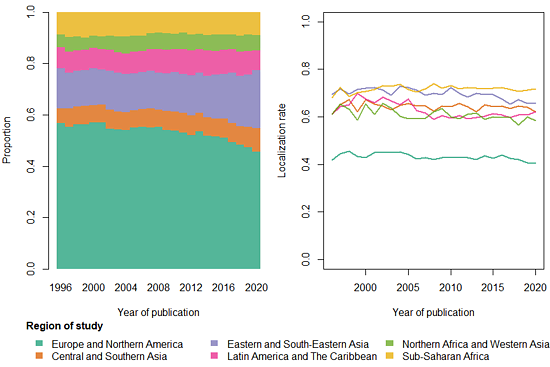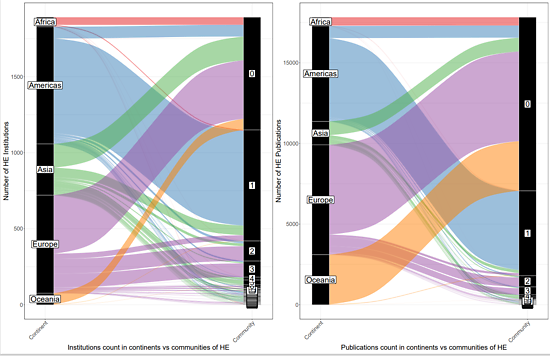Laboratory
Population Dynamics and Sustainable Well-Being
At a Glance
Projects
Publications
Team
Project
Trends and Disparities in Patterns of Scientific Knowledge Production
Aliakbar Akbaritabar, Diego Alburez-Gutierrez, Andres Castro (MPIDR / Computational Social Sciences and Humanities Programme, Barcelona Supercomputing Center, Spain); in Collaboration with Vincent Larivière (University of Montreal, Canada), Cassidy R. Sugimoto (Georgia Institute of Technology, Atlanta, USA), Flaminio Squazzoni (Università degli Studi di Milano, Italy), Dimity M. Stephen (German Centre for Higher Education Research and Science Studies GmbH, Hannover, Germany), Dehua Gao (Shandong Technology and Business University, Yantai City, China)
Different countries have different levels of production of scientific publications, with additional variations based on disciplines and fields of science. In this project, we use bibliometric data to study global trends and disparities in patterns of scientific knowledge production. Detailed Description
Naming practices in mentioning the geographic location of focus in the title of scientific publications

While about 60% of articles have a focus on Europe and North America (left) only 40% of articles mention these regions in their title (right). The reverse is the case for other regions of the world. The figure shows the distribution of the region of focus of articles in the analytical sample (Left) and localization rate by region of study (Right), 1996 to 2020 (n = 560,893). Authors from the Global South have a much higher tendency to reveal the geographic focus of their articles. © Based on the paper by Castro Torres, A. F., & Alburez-Gutierrez, D. (2022). North and South: Naming practices and the hidden dimension of global disparities in knowledge production. Proceedings of the National Academy of Sciences, 119(10), e2119373119
The regional concentration of science and scientific collaborations

While institutions in Americas are collaborating mainly with other institutions inside the same region, Europe, Africa, and Oceania are collaborating with each other and show a much higher trend of internationalized collaboration in the area of Higher Education studies. The figure shows the distribution of Higher Education (HE) studies institutions from different continents (left column of both panels) versus their membership in 36 HE studies network. Right column of both panels show the cohesive subgroups (i.e., communities) that we have identified their collaboration network. Co-authoring of publications is converted into a network where authors form one institution collaborate with authors from another institution (the left panel shows size of communities based on number of institutions, the right panel shows the productivity based on number of publications). © Based on the paper by Akbaritabar, A., & Barbato, G. An internationalised Europe and regionally focused Americas: A network analysis of higher education studies. European Journal of Education, 56(2), 219–234.
Culture, Education and Science, Projections and Forecasting, Statistics and Mathematics
Europe, Germany, Italy, World
Publications
Akbaritabar, A.; Carrasco Armijo, J. I.; Anastasiadou, A.:
MPIDR Working Paper WP-2025-004. (2025)

Castro Torres, A. F.; Akbaritabar, A.:
Bulletin of Sociological Methodology, 1–18. (2025)

Coimbra Vieira, C.; Chechik, E.; Di Césare, V.:
In: 20th International Conference on Scientometrics and Informetrics, ISSI 2025: June 23-27, 2025, Yerevan, Armenia; proceedings: volume 2, 1997–2003. Yerevan: ISSI. (2025)

Akbaritabar, A.:
EPJ Data Science 13:14, 1–12. (2024)

Akbaritabar, A.; Castro Torres, A. F.; Larivière, V.:
Humanities and Social Sciences Communications 11:914, 1–10. (2024)

Akbaritabar, A.; Rubin, B. P.:
Journal of the History of the Neurosciences, 1–22. (2024)
Basellini, U.:
Demographic Research 50:43, 1265–1280. (2024)

Castro Torres, A. F.; Akbaritabar, A.:
Quantitative Science Studies, 1–32. (2024)

Abdi Nur, A.; Akbaritabar, A.; Vignau Loria, M.; Coolman, N.; Fan, X.; Curran, S.:
MPIDR Working Paper WP-2023-027. (2023)

Akbaritabar, A.:
In: 19th International Conference on Scientometrics and Informetrics, ISSI 2023: 2-5 July 2023, Indiana University, Bloomington, IN, USA; proceedings: volume 1, 19–41. Bloomington, IN: Indiana University. (2023)

Akbaritabar, A.; Castro Torres, A. F.; Larivière, V.:
MPIDR Working Paper WP-2023-029. (2023)

Akbaritabar, A.; Stephen, D.; Squazzoni, F.:
Journal of Informetrics 16:2, 101258–101258. (2022)
Castro Torres, A. F.; Akbaritabar, A.:
arXiv e-prints 2208.05373. unpublished. (2022)

Castro Torres, A. F.; Alburez-Gutierrez, D.:
Proceedings of the National Academy of Sciences of the United States of America 119:10, e2119373119–e2119373119. (2022)

Gao, D.; Akbaritabar, A.:
Review of Managerial Science 16:2, 521–550. (2022)
Piolatto, M.; Bianchi, F.; Rota, M.; Marengoni, A.; Akbaritabar, A.; Squazzoni, F.:
BMC Public Health 22:278, 1–14. (2022)

Akbaritabar, A.:
Quantitative Science Studies 2:2, 753–777. (2021)

Akbaritabar, A.; Barbato, G.:
European Journal of Education 56:2, 219–234. (2021)

Akbaritabar, A.; Bravo, G.; Squazzoni, F.:
Science and Public Policy 48:5, 662–678. (2021)

Castro Torres, A. F.; Alburez-Gutierrez, D.:
MPIDR Working Paper WP-2021-014. (2021)
